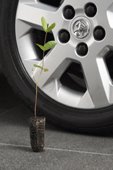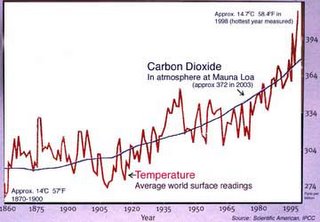Recently I wrote to the Prime Minister requesting him to convene a three-day national summit in the first half of next year on climate change and greenhouse gas emissions trading. The NSW Government believes a market-based approach is needed to tackle the problem of carbon emissions. The NSW Greenhouse Gas Abatement Scheme introduced in 2003 was the world's first mandatory emissions trading scheme. Earlier this year we extended the scheme from 2012 to 2020 and beyond until a national emissions trading scheme is established.Well and good Iemma, and probably very clever, but you lead a government that messed with my route to work with your Cross City Tunnel. Turning the CBD and neighbouring suburbs of the state's capital city in into a concrete corral designed to funnel through the tolling tunnel can't be doing much to reduce emissions. I am not blaming you, just your government. Let's just see how effective you are with Howard and the other state premiers.
Such a scheme would provide greater business and environmental certainty for Australia as carbon-dependent economies are forced to make significant emissions reductions to contribute to the abatement of global climate change. There has been a significant shift in the business sector's opinion and also strong support from conservationists. The Howard Government, however, will not participate in this vital work
As proposed to the Prime Minister, such a scheme should be the focus for the national summit which could also discuss the promotion of clean technologies, energy efficiencies and the use of taxation policies to drive down emissions. The national summit should include community members, key business sector representatives, environment groups, and prominent scientists with expertise in climate change.
I have also written to the other premiers and chief ministers who I am sure will give the summit their support. I have suggested to my colleagues that if the Prime Minister does not exercise his national leadership responsibilities and convene this summit then the states and territories should do it themselves. NSW will continue working on new approaches. Today I am releasing the Government's NSW Greenhouse Plan which comes with a $24 million funding package, including grants to promote the adoption of emissions reduction technologies. We will also commit significant funding to education about the causes and risks of climate change and for projects that promote innovation, carbon sequestration and emissions trading.
Our commitment to reducing greenhouse gas emissions is also evident from the $100 million we will spend to minimise the impact of our desalination plant. This will reduce the emissions impact by 50 per cent through renewable energy sources such as gas or wind, tree-planting programs and use of abatement certificates.
These are solid commitments to tackle greenhouse gas emissions. It is time for the Prime Minister to exercise national leadership on the major threat that climate change poses and convene this long overdue national summit to chart Australia's way forward.
Morris Iemma is the Premier of NSW.
I am not convinced that we need a desalination plant, bottled electricity as it was once famously called by your predecessor. If it is another PPP, we need that like we need a hole in our city.
 Global Warning Climate Change Environment Science CO2 Carbon Sink Earth Australia Kyoto Energy Sydney
Global Warning Climate Change Environment Science CO2 Carbon Sink Earth Australia Kyoto Energy Sydney





